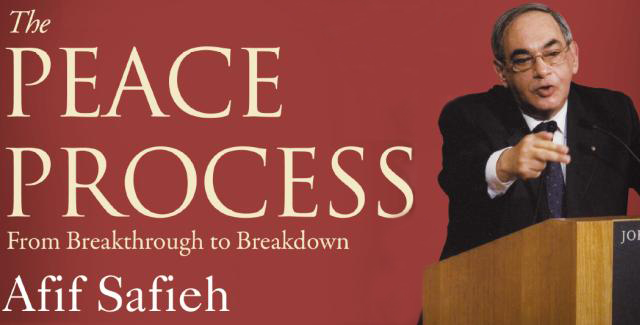Center Book
Review No. 7 (30 July 2010)
Each month, we will be conducting a review of a recent book that deals with issues relating to Palestine and/or the Israel/Palestine conflict. Books that are chosen for review can be academic or non-academic, historical or fictional. Next month we will be reviewing Faith Misplaced: The Broken Promise of U.S. Arab Relations: 1820-2001
by Ussama Makdisi. If you would like to suggest a book for review, please contact the Palestine Center.
The Peace Process: From Breakthrough to Breakdown written by Ambassador Afif Safieh
Hardcover: 285 pages, SAQI; 1 edition (02 September 2010)
Amb. Afif Safieh spoke about his book at a recent Palestine Center event, which you can watch here.
By Yousef Munayyer
Many of us have read books by popular authors. Some authors have been important parts of our lives, some have been celebrities and still others we have come to know through endless television interviews and programs. When reading their work, it’s as though you can see and hear them in their writing. Few books I have read, however, so perfectly capture the unique linguistic mannerisms of the author as Ambassador Afif Safieh’s recent book, The Peace Process: From Breakthrough to Breakdown.
This is not simply because I, like many Palestinians in America or England came to know Ambassador Safieh over time, but rather because Safieh’s personable style connects, even with strangers, in a way that only a long and storied companionship would allow. This is precisely what makes him the most effective representative of the Palestinian people I have come to know.
Through the pages of this collection of lectures, Safieh strikes the perfect balance of humility and intellect – a rare but invaluable tool in the hands of a diplomat. The book covers an important and interesting period (1981-2005) when Safieh held different posts at academic institutions, as well as diplomatic responsibilities in the Netherlands, London and the Vatican. During this period, of course, the Palestine Liberation Organization experienced tragic ups and downs including the devastation of Lebanon, the declaration of independence, recognition in negotiations, Madrid, Oslo, the return to Palestine, the failure of Oslo and so on. The commentaries given by Safieh over time provide a Palestinian insight into all that transpired in a way that is enlightening to Palestinians and non-Palestinians alike.
This important and quite prescient passage, delivered as part of a lecture in England in 2001, is a typical representation of the wisdom in Safieh’s book:
The United States remains a decisive player and I for one believe that the battle for Washington is winnable. A serious strategic debate will inevitably soon surface in Washington on the nature of the American-Israeli relationship. Is Israel still a strategic asset or is it gradually becoming a strategic burden and liability? Today, after the demise of the Soviet Union and the end of Arab militant regimes, the Arab regional system is profoundly conservative and pro-Western. Israel, by its insatiably territorial appetite, is defying, de-legitimizing and destabilizing the network of friendship America enjoys in the region. Arab public opinion, from Morocco to Muscat is boiling. Islamic public opinion, from Nigeria to Malaysia, is angry at the perceived American complacency over and complicity with Israel’s endless occupation of Palestinian territory. Israeli regional expansion, if perpetuated, can disrupt and endanger American global interests.
Given the current and evolving debate in America today about the American-Israeli relationship, one that has catapulted forward in recent years and some would even say recent months, Safieh was remarkably accurate a decade ago observing Washington from across the pond.
This book does however leave something to be desired. Published in 2010, The Peace Process: From Breakthrough to Breakdown provides Safieh’s thoughts and commentary only through 2005. The five years since have been transformative. The election of Hamas, the PA in the post-Arafat era, the bombardment of Lebanon in 2006, the siege and attacks on Gaza, the inter-Palestinian division, and the practically simultaneous rise of new players like Barack Obama and Benjamin Netanyahu’s extreme right-wing government, are all critical developments that leave the reader looking for more pages as they approach the back cover.
Perhaps Safieh’s views on this period and more will be included in his next book. I, for one, look forward to reading them.
Yousef Munayyer is Executive Director of the Palestine Center. This book review may be used without permission but with proper attribution to the Center.
The views in this review are those of the author and do not necessarily reflect those of The Jerusalem Fund.
Click here to read other book reviews.


